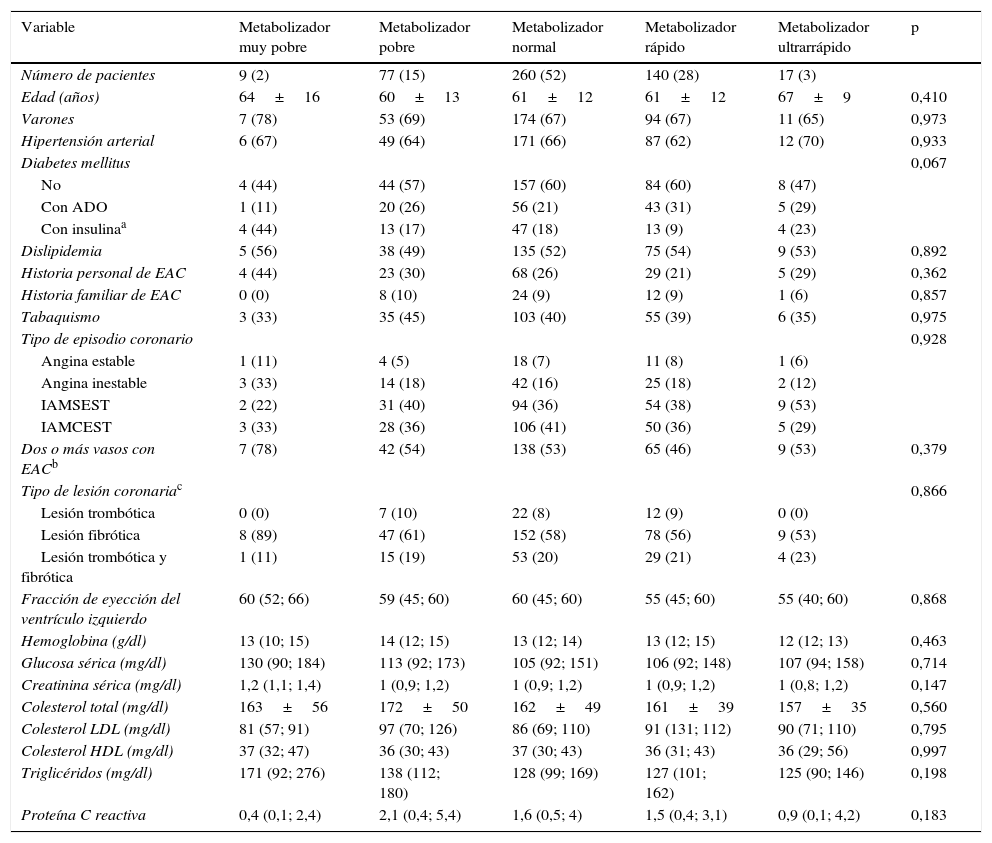El CYP2C19 es una isoforma del citocromo P450 que metaboliza una serie de fármacos y participa en la síntesis de glucocorticoides. Los polimorfismos del CYP2C19 se han asociado al riesgo genético de padecer diabetes tipo 2.
MétodosSe estudiaron 503 pacientes con síndrome coronario agudo para determinar la asociación entre la actividad de CYP2C19 (variantes CYP2C19*2, CYP2C19*3 y CYP2C19*17) y el tipo de síndrome coronario agudo, los factores de riesgo cardiovascular (hipertensión arterial sistémica, diabetes mellitus, dislipidemia y tabaquismo), los parámetros analíticos y la extensión y gravedad de la aterosclerosis coronaria.
ResultadosLa distribución de genotipos fue similar a la esperada en caucásicos. Los metabolizadores muy pobres del CYP2C19 (*2/*2, *3/* 3 o *2/*3) tuvieron una mayor tendencia a presentar diabetes mellitus con necesidad de insulina (p=0,067). Sin embargo, cuando comparamos los metabolizadores muy pobres, pobres y normales frente a los metabolizadores rápidos y ultrarrápidos encontramos diferencias significativas en los pacientes diabéticos en tratamiento con insulina (64 pacientes [18%] frente a 17 pacientes [11%], p=0,032). Por el contrario, los parámetros analíticos y el resto de los factores de riesgo cardiovascular no alcanzaron significación estadística independientemente de la actividad de CYP2C19. De forma similar, el número y el tipo de enfermedad coronaria (trombótica, fibrótica o ambas) no difirieron según la actividad enzimática del CYP2C19.
ConclusiónLos pacientes con un episodio coronario agudo y con genotipo metabolizador CYP2C19 muy pobre, pobre y normal presentan una mayor prevalencia de diabetes mellitus en tratamiento insulínico que los pacientes con un genotipo CPY2C19 con una mayor actividad enzimática (metabolizadores rápidos y ultrarrápidos).
CYP2C19 is a major isoform of cytochrome P450 that metabolizes a number of drugs and is involved in the glucocorticoids synthesis. CYP2C19 polymorphisms have been associated with the genetic risk for type 2 diabetes.
MethodsFive hundred and three patients with an acute coronary event were studied to assess the association between the CYP2C19 activity (CYP2C19*2, CYP2C19*3 and CYP2C19*17 variants) and the type of acute coronary syndrome, cardiovascular risk factors (arterial systemic hypertension, diabetes mellitus, dyslipidemia and smoking), analytical parameters and the extent and severity of coronary atherosclerosis.
ResultsGenotype distribution in our series was similar to that expected in the Caucasian population. Among the traditional cardiovascular risk factors, very poor metabolizer patients (*2/*2, *3/*3 or *2/*3) had a greater tendency to present diabetes mellitus needing insuline (P=.067). Conversely, when we compared very poor, poor and normal metabolizers vs. rapid and ultrarapid metabolizers we found significant differences in those diabetic patients under insulin treatment (64 patients [18%] vs. 17 patients [11%]; P=.032). On the contrary, analytical parameters, systemic arterial hypertension, dyslipidemia, smoking or the personal/family history of coronary artery disease did not reach statistical significance regardless of CYP2C19 activity. Similarly, the number and the type of coronary disease (thrombotic, fibrotic or both) did not differ between patients with different CYP2C19 enzyme activity.
ConclusionPatients with an acute coronary event and a very poor, poor and normal CYP2C19 metabolizer genotype have a higher prevalence of diabetes mellitus needing insuline than patients with the rapid and ultrarapid metabolizers CPY2C19 genotype.
Artículo
Comprando el artículo el PDF del mismo podrá ser descargado
Precio 19,34 €
Comprar ahora








